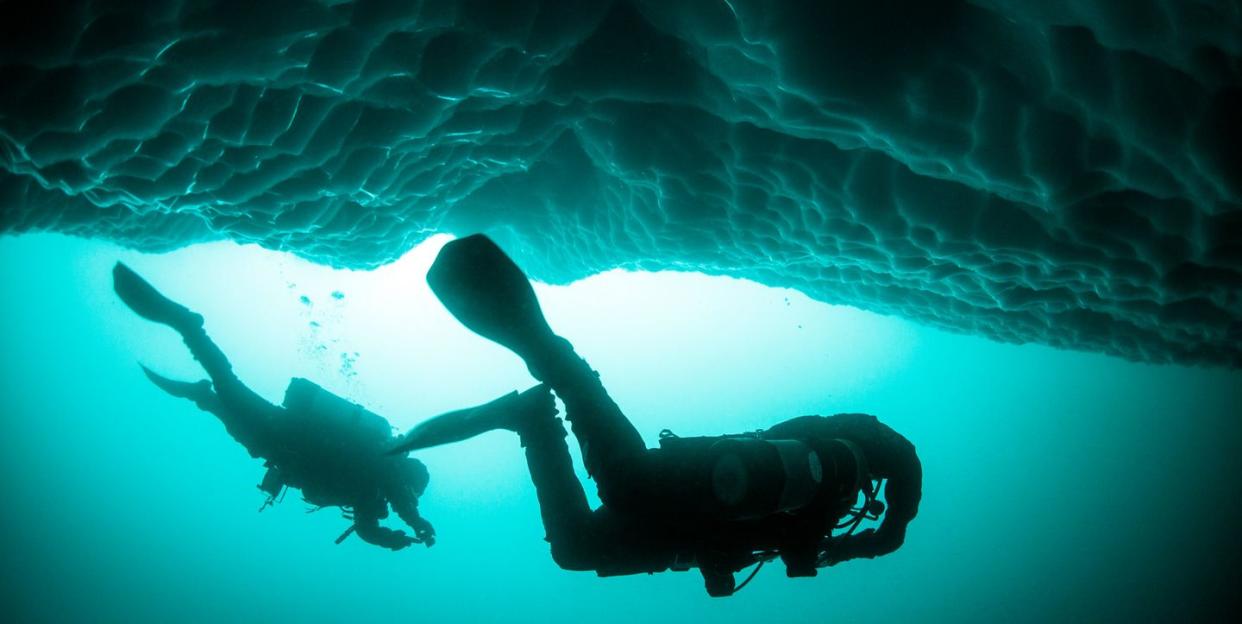I Dive Into Caves for a Living—Here's What It's Taught Me About Overcoming Fear

In her exhilarating new memoir, Into the Planet (out now via Ecco), cave diver I Dive Into Caves for a Dive for a Living—here's What It's Taught Me About Overcoming Fear offers a fish's-eye view of the terrifying beauty of the deep blue sea. Here, Heinerth offers some tips for tempering one's panic in even the most extreme situations and how to keep your head above water when all goes awry.
They are places of beauty and wonder, deep inside the planet where no man or woman has ventured. As a cave diving explorer, my dark workplace terrifies most people. I swim alone through the claustrophobic blackness of water-filled caves, where an error on the job may measure my chance of survival in single breaths. This highly-technical underwater pursuit has claimed the lives of dozens of my friends. Beyond the scientific discoveries and new maps that I have brought home from expeditions, cave diving has also taught me valuable lessons about how to survive and thrive in life. Here are five lessons cave diving has taught me about overcoming fear.
Step into the darkness.
Fear is a healthy emotion that lets us know that we care about future outcomes—but it is also capable of causing emotional paralysis. I’m scared when I go diving. I look at that as a good thing. To succeed, I have learned to visualize everything that can go wrong and mentally rehearse the solutions before I hit the water. Then, if—for example—I get entangled in a safety line, I will know how to cut and repair it in the dark. Self-awareness and personal growth have followed my frightening experiences, so I seek them out.
Recognize your mortality.
Facing fear or even death while thoughtfully engaging in risk can be very life-affirming. After getting trapped inside an iceberg cave and making a meticulous but harrowing escape, I felt intoxicated with accomplishment. I have lost experienced colleagues that were not as fortunate, so I don’t take my training for granted. I practice hard, accept the risks, and experience gratitude every day.
Breathe deep.
When I am trapped in a blinding blackout of silt and have lost the safety line, it is easy to panic. My primal brain tries to take over, seizing control of my heart and lungs. But in the face of great danger, I have learned that it is far better to turn off that primal instinct of fight or flight by taking slow, deep breaths. In controlling my breathing and heart rate, I can postpone otherwise crippling emotions and focus on the next correct decision. With practice, I can remain calm, inhaling thoughtfulness, and pragmatism that helps me take careful steps to find the lost guideline and ultimate safety. Don’t get me wrong. I am not without emotion. After I solve the problem at hand, I leave plenty of room to acknowledge the experience and even have a well-earned cry.
Understand the scope.
Big problems are not solved quickly. In a cave restriction no taller than the space beneath your couch, a panicking diver became the cork in the bottle containing my life. I had to calm her down, repair our broken safety line, and manage a failing breathing system. At that moment, trapped in the confinement of a silty cave with broken life support gear, the chattering gremlins in my head were very loud. It was tough to conjure up a vision of survival. Recognizing that I needed to take the next small yet decisive step toward a positive outcome saved my life. For seventy-three minutes beyond my dive plan, small victories added up, even as rescuers were rushing to the scene, expecting to recover my dead body. Now I know that small decisive actions add up to big successes.
Embrace failure.
It would be easy to give up cave diving after getting trapped in a cave. But each incident or aborted dive has informed me through discovery. The sum of the good, bad, and terrifying experiences in my life is not an epic failure. As a young woman, abandoning a business, filing for divorce, and fighting off an attacker were scary milestones. Facing the deaths of close colleagues have been devastating. But the entirety of those life experiences has made me wiser and stronger. By embracing every aspect of my life, I have made significant discoveries that have built who I am today.
For more ways to live your best life plus all things Oprah, sign up for our newsletter!

